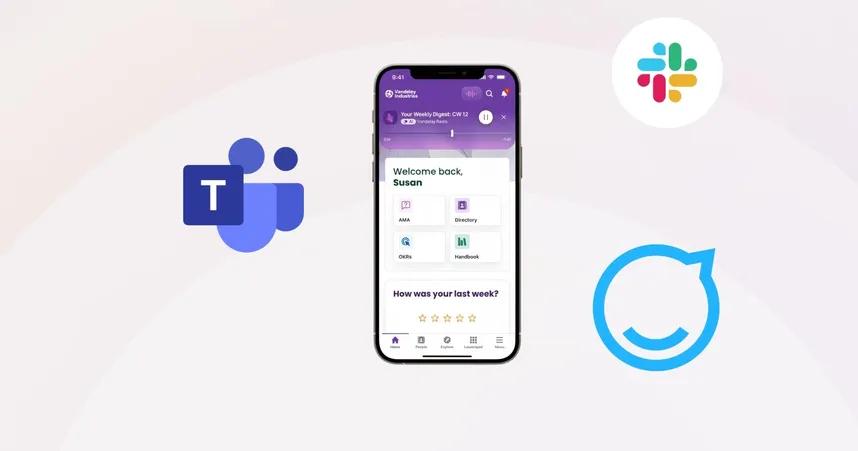Communicating as a Leader: Essential Skills & Tips for Maximum Workplace Impact
Why is communication important as a leader? Discover why leaders have to develop their own interpersonal skills rather than delegate the task to someone else for maximum business impact and employee motivation.

Leaders are tasked with cultivating many skill sets, while delegating plenty of other duties to people below them. However, leadership and communication skills are one thing high-ranking company members should never stop developing. Communicating as a leader sets the tone for the company or organization, and not just externally and with stakeholders. It plays an integral role in influencing employee motivations and creating communication transformations.
Why is communication important as a leader? Why can’t it be handed off to secretaries for them to coordinate gracefully, while HR sorts out any thorny issues among team members? Because this isn’t how companies build strong cultures. Did you know that, according to Gallup, companies that prioritized culture had an average of a 33% revenue increase along with attracting greater star talent?
Today we’re going to explore all the elements of communicating as a leader. Prepare yourself to earn respect, cooperation, productivity, and genuine admiration as an effective leader who inspires and motivates team members.
Why is leadership communication so important?
The importance of communication in leadership cannot be stressed enough. Effective leadership involves being someone who knows how to:
Navigate conversations
Build trust
Maintain respect
Command authority
Make others feel comfortable
Soon we will discuss how to develop good leadership communication skills. But first, we have to answer a burning question — why is communication important in leadership?
Let’s start by covering the easy reasons. Clear, effective, respectful communication breeds a positive work environment where employees feel as though they can communicate openly. Effective communication is a skill that many talented prospects seek in a company. Employees want to work at places where they feel respected. (Don’t lose top talent due to communications errors!)
Furthermore, good communicators are needed to create exceptional companies. People drive company success. Time and time again studies have shown that inspired and engaged employees perform better. They also feel more included in their companies.

Let’s look at some quick stats:
Effective communication can increase productivity by 25% because employees feel more engaged with their work and more connected with their colleagues according to a report by Bizfluent.
Global consulting company McKinsey & Company found that employees who feel included in detailed communication in the workplace (particularly for remote work) are 5x more likely to have increased productivity.
On the other hand, communication skills are also something that hiring managers look for when adding to the team. They also play a role when it comes time to seek a promotion. The National Association of Colleges and Employers reported that communication was ranked as the most crucial skill employers seek in new hires. In fact, it scored a rating of 4.56 out of 5 points for importance.
Here’s a final stat: the global communications market generated up to 1.55 trillion USD in revenue in 2023 (a 3 percent increase from 2022). Why? Communications matter. So why is communication important as a leader? Because in the long run, companies that invest in good communication will profit.
The Impact of Communicating Effectively as a Leader

There are many benefits of effective leadership communication. When leaders communicate effectively, they set clear expectations, reduce misunderstandings, and ensure that everyone is aligned with the organizational goals.
Improving communication skills as a leader can significantly enhance team collaboration and productivity. Leaders who actively listen and encourage input create an environment where team members feel valued and motivated. This open communication fosters a culture of trust and mutual respect.
Communicating effectively as a leader:
Enhances team collaboration by enforcing roles and responsibilities for easier teamwork
Increase productivity through clear instructions and feedback that reduce errors
Builds trust through transparency, honesty, and mutual understanding
Improves employee engagement by involving employees in decisions
Facilitates conflict resolution by addressing small issues before they escalate
Supports change management by setting and managing employee expectations
Enhances decision-making by clearly providing relevant information
Promotes Innovation by encouraging open dialogue and the sharing of ideas
Aligns organizational goals by ensuring alignment with the company’s values and objectives
Improves employee morale by creating a supportive and encouraging work environment
Reduces miscommunication to facilitate more efficient operations and fewer setbacks
Fosters accountability by clearly communicating expectations and responsibilities
Supports professional development through constructive feedback and open communication
The importance of communication skills in leadership cannot be overstated, as they are essential for effectively guiding and inspiring a team. Ultimately, effective leadership communication is the cornerstone of a thriving and successful organization.
10 Essential Communication Skills for Leaders
When it comes to communicating as a leader, there’s an entire array of skillsets ranging from good communication skills others admire to poor communication that can seriously damage a company internally. And remember: strong companies are built from the inside out.
The following list of leadership and effective communication skills will foster effective communication and turn good leaders into great leaders. Rather than provide an overview of effective communication skills as a leader, there are details, resources, and research to support each area of building effective communication.
1. Work on Active Listening
When it comes to good communication skills, active listening is at the top of the list. Good communicators are not those who are focused on what they will say next in the conversation. Rather, they are the people who are actively listening to what their conversation partner is saying.
Leaders must listen attentively, understand others’ perspectives, and respond appropriately. This involves being present in the conversation and picking up on the communication styles of the people around you. Mention things people told you, pose open-ended questions, maintain eye contact, and avoid judging the person you are talking with.
Looking for some resources to boost your communication skills as a leader? You’re Not Listening: What You’re Missing and Why It Matters by Kate Murphy underscores the significance of listening and highlights the gaps we may be unknowingly having in our conversations. Don’t allow these oversights to blemish your effective communication in leadership.
2. Develop and Practice Empathy
Wait — isn’t empathy something you’re born with? Many people appear to have an innate empathy for others, but empathy is also something to develop to become a more effective leader. Demonstrating concern and understanding for team members’ emotions and viewpoints builds trust and rapport that builds essential comfort and safety in the workplace.
As the Center for Creative Leadership concluded, empathetic leadership positively correlates to better job performance. Empathy means that leaders envision what the other person is feeling and attempt to put themselves in their situation rather than just display sympathy, which is often interpreted as pity.
The Center for Creative Leadership recommends that an effective leader pays attention to their team members and watch for signs of burnout. They should demonstrate a sincere interest in the interests, needs, and goals of others. Leaders can also express empathy by showing a willingness to help others and expressing sincere compassion during times of hardship.
3. Navigate Nonverbals
Communicating effectively as a leader is about far more than what you say. In fact, Dr. Mehrabian, a well-known researcher of nonverbal communication, released a popular theory that the interpretation of a message is 7 percent verbal, 38 percent vocal, and 55 percent visual. Therefore, 93 percent of communication is alleged to be nonverbal.
Understanding and effectively using body language is of the utmost importance for building communication skills as a leader. For example, retired FBI special agent and former spy catcher Joe Navarro revealed on the Aspire to Inspire podcast that people feel nervous when they have video calls with people who sit ramrod straight and don’t move or gesture. Why? Because this is unnatural.
Joe, a nonverbal communications expert, penned the international bestseller What Every BODY Is Saying to help people understand what their body language is really conveying to others. Communicating as a leader involves converting nonverbals — such as facial expressions, eye contact, and hand gestures — that depict a calm and commanding exterior rather than an overly intimidating or easily dismissed one.
4. Build Trust Through Transparency, Clarity, and Honesty
Several leadership and communication skills work together to create trust in the workplace. Transparency, clarity, and honesty go hand-in-hand when it comes to fostering interpersonal skills for leaders. Employees will respect, trust, and probably like leaders who are open.
As Barack Obama’s former Campaign Manager David Plouffe revealed, former President Obama was an effective communicator in part because of how he addressed issues that arose unexpectedly. To build trust during crises, good communication skills are essential. Leaders should deliver as much bad news at once and be honest about what they do and don’t know, as well as what they will do to fix the issue.
It’s always important that effective communication in leadership involves honesty, which means never downplaying problems or shifting blame to others. Even when things are running smoothly, sharing decisions with employees and involving them in the process helps to build trust and foster a strong company culture in which employees are actively engaged.
5. Foster an Open-Feedback Workplace
Did you know that Gallup reported a whopping 80 percent of employees who reported receiving meaningful feedback in the past week felt fully engaged? Giving and receiving feedback in the workplace is essential for employee engagement and employee retention, making it a key element of good communication skills.
Feedback is somewhat similar to active listening, meaning it shouldn’t be a one-way street. It includes being able to ask open-ended questions to people in leadership positions because employees feel comfortable being honest, open, and forthcoming. Feedback should also be received with the same grace, as receiving and implementing feedback is necessary for both growth and recognition.
Providing effective feedback is a critical aspect of leadership and communication skills. Constructive feedback should be specific, actionable, and delivered in a way that motivates and enhances performance. This involves highlighting exact behaviors or outcomes that need improvement and suggesting clear, practical steps for achieving better results.
Leaders with strong communication skills know how to frame feedback in a positive, encouraging manner, focusing on growth and development rather than criticism. This approach not only helps individuals understand what is expected but also fosters a supportive environment where team members feel valued and motivated to improve.
6. Focus on Being Brief & Concise
Demonstrating strong communication skills as a leader helps in building trust and respect through being mindful of other people’s time. A famous quote attributed to Mark Twain reads, “I didn’t have time to write a short letter, so I wrote a long one instead.” Good communicators know it’s harder to be precise, which is why this is a skill great leaders work hard to possess.
How to Write Short by Roy Peter Clark is one resource for fostering effective leadership through improving written communication. This book focuses on writing concisely and removing unnecessary phrases. This will allow communicating as a leader to eventually become easier, as it will soon start to be apparent how few words are needed to convey a complete message.
7. Practice Public Speaking
Public speaking is another virtual element of communicating effectively as a leader. Your communication skills as a leader will be tested in times of crisis, making it crucial to stay calm and clear. Likewise, there will be moments when leadership and communication skills must evoke inspiration and morale.
Being able to confidently and effectively address groups of people, whether in meetings, presentations, or speeches, is a hallmark of an effective leader. Developing different communication styles and feeling comfortable in front of crowds are things that improve with practice and time. If you know public speaking is a weak spot, consider taking a program for public speaking, such as Oxford Women’s Leadership Development.
Another easy and time-efficient way to improve your public speaking skills is to practice reading aloud when in your office. Practice speeches around your family or trusted colleagues so that you are comfortable with the material, but ensure that you remain personable and don’t come across as rehearsed.
8. Develop the Art of Storytelling
Did you know that storytelling is an essential thread you can interweave with leadership and communication skills? Communicating as a leader should involve using stories to illustrate points, inspire, and connect with the audience on an emotional level. Great leaders can speak to employee motivations by crafting a compelling story.
The London School of Business found that people tend to remember only 5 to 10 percent of information presented as statistics alone. However, they remember 65 to 70 percent of information embedded within a story. This information was cited in Story Based Selling: Create, Connect, and Close by Jeff Bloomfield, which is also a great resource for leaders seeking to be more persuasive and charismatic storytellers.
Great stories in business are those that inspire action. Being a compelling storyteller should involve evoking emotion in your audience so that they set out on a certain goal or desire to meet an objective. Learn how to tell better stories to tap into the emotions of those around you.
9. Work on Honing Influence
Recognizing why communication is important for a leader can lead to the development of stronger relationships and increased trust within the team. Effective leadership and communication skills can make teams feel both uniform and inspired. The power to wield such influence over a team cannot be taken lightly.
There are three key ways to convince others to support ideas or initiatives: logical reasoning (logos), credible evidence (ethos), and emotional appeal (pathos). To know which tool to wield, build close relationships. Communicating effectively as a leader involves building trust, active listening, and being consistent. Take some time to understand the people around you and learn how to appeal to them.
Don’t underplay the significance of influence, especially in the emerging workforce. Influencer marketing is rising for a reason, as people are seeking specific sources they can trust. Become the embodiment of trust for your team to better integrate in a world where 69 percent of consumers trust influencer recommendations and 81 percent of consumers embraced influencer marketing in 2023. The answer is clear in business as well: people want to be personally inspired.
10. Evolve Your Emotional Intelligence
Honing your leadership and communication skills is not complete until you work on developing your emotional intelligence, or EQ. Recognizing and managing one’s own emotions and the emotions of others is a hallmark of effective leadership. Having a higher EQ enhances communication and relationships and improves interpersonal skills for leaders.
Improving emotional intelligence involves a mixture of nurturing empathy, active listening, resolving conflicts, and being emotionally aware. Be honest with yourself about your weaknesses and strengths. Your team members will respect you more if you are personable and honest than if you put forward an unshakable perception of being superhuman.
Should you really become more vulnerable as a leader? The Harvard Business Review thinks so. In their piece on the subject, they concluded that leaders who practice vulnerability build psychologically safer world environments that empower people to be themselves. This encourages creative risks and innovative contributions.
Tips for Communicating as a Leader More Effectively

Communicating effectively as a leader takes continual growth and effort. Great leaders develop effective communication strategies over time and learn to adapt approaches based on audiences and responses. However, there are some general tips to follow to improve your leadership communication skills.
Set Clear Expectations: Clearly defined goals and standards ensure everyone is on the same page, reducing confusion and increasing productivity. Regularly revisit expectations to keep everyone aligned.
Ask Good Questions: Asking insightful and relevant questions can drive deeper understanding and uncover valuable insights. Good questions show that you are engaged and care about the input and perspectives of your team.
Listen & Encourage Input: By genuinely listening and encouraging input from team members, leaders can build trust and ensure that everyone feels valued and heard. This also helps in making well-informed decisions.
Take Feedback Seriously: Constructive feedback is essential for growth. Leaders who take feedback seriously demonstrate their commitment to improvement and their respect for other perspectives.
Affirm with Actions: Leaders must back up their words with actions. When leaders follow through on their promises, it reinforces their commitment and integrity and builds trust.
Initiate Tough Conversations: Avoiding difficult conversations can lead to unresolved issues. Effective leaders confront challenges with empathy and clarity and address issues before they escalate.
Involve Others Before Developing a Plan of Action: Including team members in the planning process fosters a sense of ownership and collaboration. By involving others, leaders can tap into diverse perspectives and expertise.
Encourage Open Dialogue: Creating a safe space where team members feel comfortable sharing their thoughts and ideas without fear of judgment fosters innovation and collaboration. This leads to a more engaged and motivated team.
Great leaders work hard to be a living embodiment of these values in order to continuously promote constructive and collaborative communication.
The Importance of Communication in Leadership
Overall, the importance of communication in leadership cannot be undervalued. Communication is essential for building relationships in which both parties feel respected, heard, and empowered. Taking the time to develop leadership and communication skills will go a long way in pioneering a successful team that navigates conflicts and achieves objectives together.
A final thing to consider is the significance of connecting the company with digital tools such as a company intranet or an employee app. These modern solutions allow for greater communication, collaboration, and alignment between team members and departments despite their proximity to one another. It’s vital that every member of the company has easy access to information and can share their opinions with others.
Remember — effective communication skills as a leader involve not only speaking but also actively listening to your team members. A company cannot thrive if it cannot hear its employees. Leaders should welcome connection and feedback and ensure that communication channels are always open.









